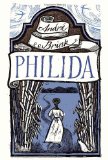Summary | Excerpt | Reading Guide | Reviews | Beyond the Book | Read-Alikes | Genres & Themes | Author Bio

This article relates to Philida
Afrikaans words or expressions are peppered throughout André Brink's novel, Philida. Brink started his career writing in Afrikaans, his native language, but switched to writing in English interspersed with Afrikaans which he uses to help maintain the authenticity of his characters. Many of the words can be puzzled out from the context of their use but some are a bit more of a challenge.
 Afrikaans originated in the 17th century as Dutch settlers moved into South Africa. The language is rooted in Dutch but has been blended and influenced by the languages of the Khoikhoi people as well as those from slaves brought to the Cape region from Malaya, Indonesia, Madagascar and West Africa. German and French also influenced the language's development. Afrikaans, as spoken today, is the product of over 300 years of mingled dialects. The Afrikaans Language Monument in Paarl, South Africa, commemorates it being declared an official language of South Africa separate from Dutch.
Afrikaans originated in the 17th century as Dutch settlers moved into South Africa. The language is rooted in Dutch but has been blended and influenced by the languages of the Khoikhoi people as well as those from slaves brought to the Cape region from Malaya, Indonesia, Madagascar and West Africa. German and French also influenced the language's development. Afrikaans, as spoken today, is the product of over 300 years of mingled dialects. The Afrikaans Language Monument in Paarl, South Africa, commemorates it being declared an official language of South Africa separate from Dutch.
Though spoken by people of different racial ethnicities in South Africa, Afrikaans is still strongly associated with the country's National Party, which was elected to power in 1948. Though racial segregation had been taking place in the country for hundreds of years, the National Party officially instituted apartheid. The inhumane and ruthless practices undertaken during the years the National Party was in power forged a link between the Afrikaans language and a dangerous and offensive political system.
Between 1990 and 1993 the apartheid laws were dismantled, and in 1994 South Africa held its first national election where all citizens of legal voting age had the right to cast a ballot. During the 1994 meeting of the Constitutional Assembly, the Afrikaans language was downgraded in status. Though still an officially recognized language, it became one of eleven official languages in South Africa. Prior to the Assembly, English and Afrikaans had been the only two officially recognized languages for the country.
Presently, Afrikaans is the third most spoken language in the nation. But the use of different languages varies, depending on the region of the country. Some parts of South Africa, the Northern and Western Capes for example, have approximately 50% of their populations speaking Afrikaans.
Picture from Wikipedia.org
Filed under Places, Cultures & Identities
![]() This article relates to Philida.
It first ran in the March 6, 2013
issue of BookBrowse Recommends.
This article relates to Philida.
It first ran in the March 6, 2013
issue of BookBrowse Recommends.






Your guide toexceptional books
BookBrowse seeks out and recommends the best in contemporary fiction and nonfiction—books that not only engage and entertain but also deepen our understanding of ourselves and the world around us.